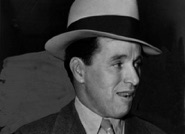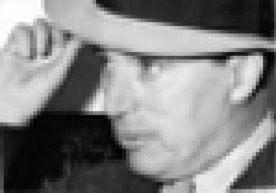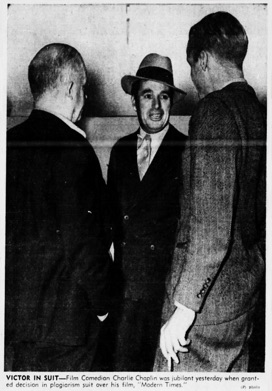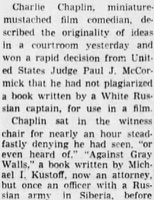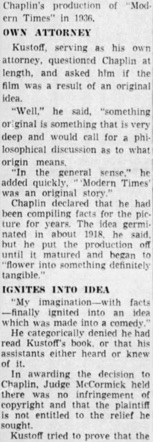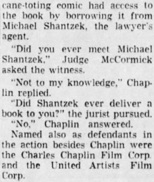Modern Times 1935 1936 1937 next previous
Modern Times Clippings 382/382
Syracuse Herald American, Syracuse, N. Y., November 19, 1939.
Los Angeles, Nov. 18, 1939: Charles Chaplin leaves court
after winning plagiarism suit. Two photos.
& VICTOR IN SUIT – Film Comedian Charlie Chaplin
was jubilant yesterday when granted decision in plagiarism
suit over his film, Modern Times.“
(...) AP Photo, Los Angeles Times, Nov. 19, 1939
AP, Associated Press.
„Modern Times was an original story“
Editorial content. „Chaplin Wins Decision in Plagiarism Suit
Charlie Chaplin, miniature-mustached comedian,
described the originality of ideas in a courtroom yesterday
and won a rapid decision from United States Judge
Paul J. McCormick that he had not plagiarized a book written
by a White Russian captain, for use in a film.
Chaplin sat in the witness chair for nearly an hour
stead-fastly denying he had seen, ,or even heard
of,‘ Against Gray Walls, a book written by Michael I. Kustoff,
now an attorney, but once an officer with a Russian
army in Siberia, before Chaplin‘s production of Modern
Times in 1936.
OWN ATTORNEY
Kustoff, serving as his own attorney, questioned
Chaplin at length, and asked him if the film was a result of an
original idea.
,Well,‘ he said, ,something original is something that
is very deep and would call for a philosophical discussion
as to what origin means
,In the general sense,‘ he added quickly, ,Modern
Times was an original story.‘
Chaplin declared that he had been compiling facts for
the picture for years. The idea germinated in about
1918, he said, but he put the production off until it matured
and began to ,flower into something definitely
tangible.‘
IGNITES INTO IDEA
,My imagination – with facts – finally ignited into an idea
which made into a comedy.‘
He categorically denied he had read Kustoff‘s book,
or that his assistants either heard or knew of it.
In awarding the decision to Chaplin, Judge Paul J.
McCormick held there was no infringement
of copyright and that the plaintiff is not entitled to the
relief he sought.
Kustoff tried to prove that the cane-toting comic had
access to the book by borrowing it from Michael
Shantzek, the lawyer‘s agent.
,Did you ever meet Michael Shantzek,‘ Judge McCormick
asked the witness.
,Not to my knowledge,‘ Chaplin replied.
,Did Shantzek ever deliver a book to you?‘ the jurist
pursued.
,No,‘ Chaplin answered.
Named also as defendants in the action besides
Chaplin were the Charles Chaplin Film Corp. and the United
Artists Film Corp.“
Redaktioneller Inhalt
Modern Times 1935 1936 1937 next previous

